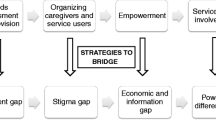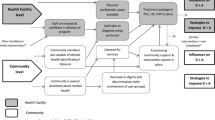Abstract
This study evaluates the implementation of a national advocacy programme for mental health care users, conducted by the South African National Department of Health and the South African Federation for Mental Health. Semi-structured interviews were conducted with care users (n = 18), service providers (n = 9), support persons (n = 6), NGO directors (n = 4), and programme managers in the DoH (n = 4). Although informational benefits were highlighted from programme empowerment sessions, very few advocacy groups were subsequently established. Barriers to establishing and conducting advocacy groups included a lack of follow-up support, pervasive stigma from communities and health care workers, low self-confidence, and a lack of financial resources. Facilitators for establishment of groups included conducting empowerment sessions and identifying ‘mental health champions’ at clinics, improving mental health training for health workers, dispensing psychiatric medication to patients on the same day, providing funding for non-governmental organisations, conducting national awareness campaigns, and establishing holistic rehabilitation centres for care users.
Similar content being viewed by others
References
Botha, U. A., Koen, L., & Niehaus, D. J. (2006). Perceptions of a South African schizophrenia population with regards to community attitudes towards their illness. Social Psychiatry and Psychiatric Epidemiology, 41(8), 619–623.
Carey, E., & Griffiths, C. (2017). Recruitment and consent of adults with intellectual disabilities in a classic grounded theory research study: Ethical and methodological considerations. Disability & Society, 32(2), 193–212.
Cooper, S., Bhana, A., Drew, N., Faydi, E., Flisher, A., Kakuma, R., Kleintjes, S., Lund, C., Ofori-Atta, A., Skeen, S., & The MHaPP Research Programme Consortium. (2011). Recommendations for improving mental healthcare systems in Africa: Lessons from Ghana, Uganda, South Africa and Zambia. In K. Kondlo, & C. Ejiogu (Eds), Governance in the 21st century: Africa in focus (pp. 309–325). Cape Town: HSRC Press.
Declaration of Helsinki. (2013). World Medical Association Declaration of Helsinki: Ethical principles for medical research involving human subjects. JAMA, 284, 3043–3045.
Docrat, S., Besada, D., Cleary, S., Daviaud, E., & Lund, C. (2019). Mental health system costs, resources and constraints in South Africa: A national survey. Health Policy and Planning, 34(9), 706–719.
DoH. (2013). National mental health policy framework and strategic plan 2013–2020. Republic of South Africa.
Dudley, J. R. (2000). Confronting stigma within the services system. Social Work, 45(5), 449.
Eaton, J., McCay, L., Semrau, M., Chatterjee, S., Baingana, F., Araya, R., Ntulo, C., Thornicroft, G., & Saxena, S. (2011). Scale up of services for mental health in low-income and middle-income countries. The Lancet, 378(9802), 1592–1603.
Hann, K., Pearson, H., Campbell, D., Sesay, D., & Eaton, J. (2015). Factors for success in mental health advocacy. Global Health Action, 8(1), 28791.
Hugo, C. J., Boshoff, D. E., Traut, A., Zungu-Dirwayi, N., & Stein, D. J. (2003). Community attitudes toward and knowledge of mental illness in South Africa. Social Psychiatry and Psychiatric Epidemiology, 38(12), 715–719.
Kakuma, R., Kleintjes, S., Lund, C., Drew, N., Green, A., & Flisher, A. (2010). Mental Health Stigma: What is being done to raise awareness and reduce stigma in South Africa? African Journal of Psychiatry, 13(10).
Kleintjes, S., Lund, C., & Swartz, L. (2013). Organising for self-advocacy in mental health: Experiences from seven African countries. African Journal of Psychiatry, 16(3), 187–195.
Knaak, S., Mantler, E., & Szeto, A. (2017). Mental illness-related stigma in healthcare: Barriers to access and care and evidence-based solutions. Healthcare Management Forum, 30(2), 111–116.
Kohrt, B. A., Turner, E. L., Rai, S., Bhardwaj, A., Sikkema, K. J., Adelekun, A., Dhakal, M., Luitel, N. P., Lund, C., Patel, V., & Jordans, M. J. (2020). Reducing mental illness stigma in healthcare settings: Proof of concept for a social contact intervention to address what matters most for primary care providers. Social Science & Medicine, 250, 112852.
Lancet Global Mental Health Group. (2007). Scale up services for mental disorders: A call for action. The Lancet, 370(9594), 1241–1252.
Lund, C., De Silva, M., Plagerson, S., Cooper, S., Chisholm, D., Das, J., Knapp, M., & Patel, V. (2011). Poverty and mental disorders: Breaking the cycle in low-income and middle-income countries. The Lancet, 378(9801), 1502–1514.
Mahomed, F. (2016). Stigma on the basis of psychosocial disability: A structural human rights violation. South African Journal on Human Rights, 32(3), 490–509.
Morgan, A. J., Reavley, N. J., Ross, A., San Too, L., & Jorm, A. F. (2018). Interventions to reduce stigma towards people with severe mental illness: Systematic review and meta-analysis. Journal of Psychiatric Research, 103, 120–133.
National Health Research Ethics Committee. (2004). Ethics in health research: Principles, structures and processes. Pretoria: Department of Health.
Ritchie, J., & Spencer, L. (2002). Qualitative data analysis for applied policy research. In Analyzing qualitative data (pp. 187–208). Routledge.
SAFMH. (2020). South African Federation for Mental Health. https://www.safmh.org.za/.
Saraceno, B., van Ommeren, M., Batniji, R., Cohen, A., Gureje, O., Mahoney, J., Sridhar, D., & Underhill, C. (2007). Barriers to improvement of mental health services in low-income and middle-income countries. The Lancet, 370(9593), 1164–1174.
Saxena, S., Thornicroft, G., Knapp, M., & Whiteford, H. (2007). Resources for mental health: Scarcity, inequity, and inefficiency. The Lancet, 370(9590), 878–889.
Seale, C. (2004). Researching society and culture. Sage.
Whiteford, H. A., Ferrari, A. J., Degenhardt, L., Feigin, V., & Vos, T. (2015). The global burden of mental, neurological and substance use disorders: an analysis from the Global Burden of Disease Study 2010. PLoS ONE, 10(2), e0116820.
WHO. (2001). The World Health Report 2001: Mental health: New understanding, new hope. World Health Organization.
Acknowledgements
The authors would like to acknowledge the participants, particularly the mental health care users, who participated in this study. They gave of their time and energy without expectation of reward in return, in the desire to have their voices heard and to speak out for the thousands of others who face the same challenges every day. We are deeply grateful for their time. The authors would also like to acknowledge the South African National Department of Health as the funder of this study.
Author information
Authors and Affiliations
Corresponding author
Ethics declarations
Conflict of interest
The authors state no conflict of interest in the study, and all authors certify responsibility for the manuscript.
Ethical Approval
Ethical approval for the study was obtained from the University of Cape Town’s Human Research Ethics Committee (HREC), Reference Number: 126-2019. The study complied with the Declaration of Helsinki (2013), and the National Department of Health: Ethics in Health Research: Principles Structures and Processes (2004).
Additional information
Publisher's Note
Springer Nature remains neutral with regard to jurisdictional claims in published maps and institutional affiliations.
Rights and permissions
About this article
Cite this article
Davies, T., Roomaney, R., Lund, C. et al. Evaluation of an Advocacy Programme for Mental Health Care Users in South Africa: A Mixed Methods Study. Community Ment Health J 58, 720–728 (2022). https://doi.org/10.1007/s10597-021-00877-8
Received:
Accepted:
Published:
Issue Date:
DOI: https://doi.org/10.1007/s10597-021-00877-8




